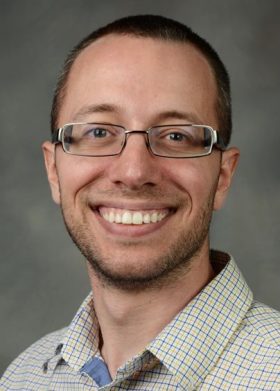Chris Richardson, assistant professor of physics at Elon, and a collaborator at UNC will receive the equivalent of $10,000 in computational resources from a National Science Foundation-funded program.
Chris Richardson, assistant professor of physics at Elon, and Sheila Kannappan, associate professor of physics at the University of North Carolina at Chapel Hill, have received a grant from the Extreme Science and Engineering Discovery Environment (XSEDE) program for computational astrophysics research involving dwarf galaxies.

Applications for resources through XSEDE undergo a competitive, peer-reviewed process, with the proposal by Richardson and Kannappan, “Improving Stellar Population Synthesis Modeling of Emission Line Galaxies in the RESOLVE Survey,” receiving full funding.
Richardson, the principal investigator for the project, will use the funds for addressing emission line contamination in observations of local dwarf galaxies, while working with physics major Sam Jenkins ’19 on constraining anomalously high temperatures in emission line galaxies. Kannappan will use the resources for hierarchical Bayesian modeling of star clusters in exotic dwarf galaxies.


